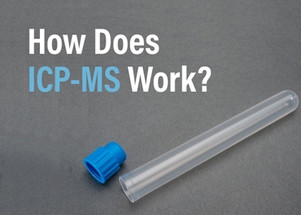Posted by Chrom Tech on 14th Oct 2025
How Does ICP-MS Work?
Inductively Coupled Plasma Mass Spectrometry (ICP-MS) is a powerful analytical technique used to identify and quantify elements within a sample. Unlike LC/MS and GC/MS—which target molecules and compounds—ICP-MS analyzes elemental composition. In this method, an argon plasma ionizes the sample, and the resulting ions are analyzed by a mass spectrometer, allowing for exceptionally low detection limits across nearly all detectable elements.
Steps in ICP-MS Analysis
1. Choose the Right Configuration
Selecting the correct hardware configuration is essential and depends on the type of sample and analysis goals. Always ensure your setup adheres to standard operating procedures (SOPs) and industry-specific regulations.
2. Perform Instrument Maintenance
Routine maintenance is critical before each run. Confirm that the torch, nebulizer, cones, and interface are clean and properly aligned to guarantee reliable, reproducible performance.
3. Prepare Samples
Sample preparation is one of the most important aspects of ICP-MS analysis and varies by sample type:
- Water samples: Typically prepared through simple acidification.
- Solid samples: Often require digestion using acids, fusion, or organic solvent solubilization.
Key preparation factors include:
- Total Dissolved Solids (TDS) – Determines the appropriate dilution and instrument settings.
- Analyte Stability – Some analytes require specific acids for stability (e.g., mercury requires HCl).
- Element Concentration – Calibration standards must match expected analyte ranges.
- Acids and Solvents – Concentration levels may dictate compatible sample introduction systems.
- Particulates – Filtration or centrifugation helps prevent nebulizer clogging and cone blockage.
4. Optimize Instrument Performance
Once the system is started, run optimization or tuning procedures to confirm instrument readiness. Most modern ICP-MS instruments perform automated checks to optimize gas flow, torch position, and detector sensitivity.
5. Configure the Method
Set up the analytical method by selecting the isotope masses to measure, assigning internal standards to correct for drift, and defining integration times, rinse intervals, and collision/reaction gas modes. Many systems include template methods for common analyses.
6. Organize Sample Analysis
Create a structured sequence or batch list that outlines calibration standards, blanks, QC checks, and sample order. Automation tools or LIMS integration can simplify and standardize this process for routine analyses.
7. Quality Control and Reporting
After analysis, verify quality control data manually or through automated software validation. Any anomalies in blanks, calibration recovery, or internal standards should trigger reanalysis or recalibration before final reporting.
By adhering to these best practices, laboratories can ensure consistent, accurate, and compliant ICP-MS data generation.
Applications of ICP-MS
ICP-MS is widely used across multiple scientific fields, including environmental testing, pharmaceuticals, food safety, life sciences, mining, and materials analysis. It detects nearly all elements except hydrogen (H), helium (He), argon (Ar), nitrogen (N), oxygen (O), fluorine (F), and neon (Ne)—which are either below detection range or interfered with by the plasma gas itself.
Common Sample Types for ICP-MS
- Liquid Samples – Ideal for water or digested solids.
- Organic Solvents – Suitable for organic matrices with specialized introduction systems.
- Nanoparticles – Enables ultra-trace analysis and size characterization at the nanoscale.
- Direct Analysis – When paired with accessories, ICP-MS can analyze solids or gases directly.
- Chromatographic Coupling – Combining ICP-MS with HPLC, IC, GC, CE, or FFF allows for speciation analysis—distinguishing between chemical forms of the same element.
With its unmatched sensitivity and versatility, ICP-MS is indispensable for researchers requiring ultra-trace elemental detection and characterization across diverse industries.
Choosing the Right Tubes for ICP-MS
Unlike chromatography, which often relies on glass vials, ICP-MS analysis requires plastic autosampler tubes to prevent trace metal adsorption. Glass can bind certain metal ions, leading to inaccurate readings. Chrom Tech offers virgin polypropylene autosampler tubes and caps compatible with AA, ICP-MS, ICP-OES, TOC, UV-VIS, HPLC, FIA, and GPC systems.
Our tubes provide excellent clarity, chemical resistance, and acid tolerance—at a fraction of the price of OEM brands. They are compatible with popular instruments from Agilent, PerkinElmer, Lachat, Leeman Labs, and others, making them an excellent choice for cost-conscious laboratories that demand reliability and performance.
Quality Control in ICP-MS
Quality control (QC) verification ensures that ICP-MS results are both accurate and compliant. QC can be performed through a combination of automated, manual, and regulatory methods:
- Automated Systems – Built-in software automatically flags potential issues in calibration or recovery, allowing rapid troubleshooting.
- Manual Review – Analysts may manually inspect QC data within a LIMS for additional validation.
- Regulatory Compliance – Certain analytical methods require mid-run QC checks. Deviations trigger corrective actions such as recalibration or reanalysis.
By combining these QC strategies, laboratories maintain the highest analytical standards and data integrity across all ICP-MS workflows.
Conclusion
ICP-MS remains one of the most precise and adaptable techniques in modern analytical chemistry. Its capability to detect trace elements in virtually any matrix makes it indispensable for environmental, pharmaceutical, and materials research.
By following a comprehensive workflow—from careful sample prep to rigorous QC validation—laboratories can produce highly accurate, reproducible results. As ICP-MS technology continues to evolve, Chrom Tech remains a trusted resource for ICP-MS consumables that support precision, reliability, and efficiency.
Frequently Asked Questions About ICP-MS
What is the primary advantage of ICP-MS?
ICP-MS provides ultra-trace elemental detection across a wide dynamic range with minimal sample volume, making it ideal for environmental, clinical, and material testing.
Can ICP-MS analyze solid or gaseous samples?
Yes. While ICP-MS primarily analyzes liquids, it can be equipped with accessories for direct solid or gas analysis without sample digestion.
Why are polypropylene tubes preferred over glass for ICP-MS?
Plastic tubes, such as those made from virgin polypropylene, prevent trace metal adsorption and leaching that can occur with borosilicate glass, ensuring more accurate measurements.
How does ICP-MS differ from LC/MS and GC/MS?
LC/MS and GC/MS identify and quantify organic molecules, whereas ICP-MS measures elemental composition using plasma-based ionization.

